Splendid Brocades Embody Tujias' History, Culture

Xilankapu, which means "knitted floral bedclothes" in the Tujia dialect, is a kind of traditional brocade woven by ethnic Tujia people. Xilankapu records the Tujias' lifestyle and traditions, and it is reputed as the "colorful living fossil" of the Tujia ethnic group. In 2006, the weaving craft of Tujia brocade was included on the first list of the nation's intangible cultural heritage.
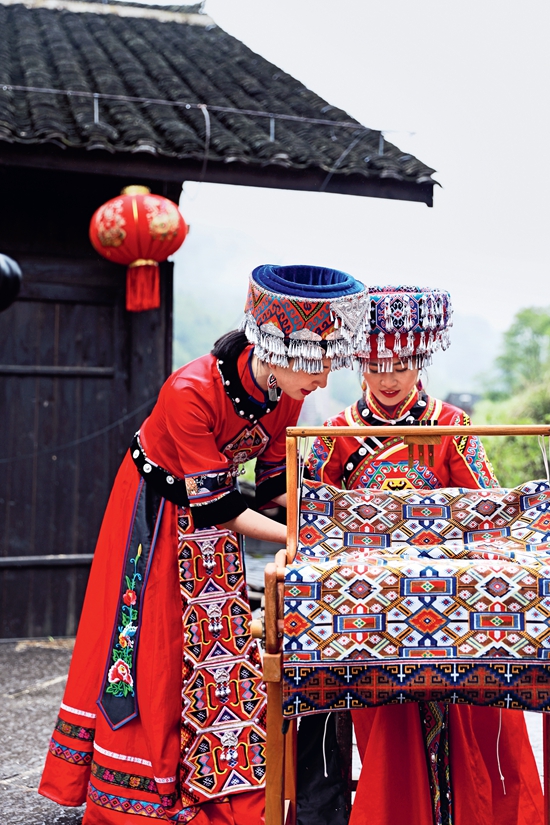
Cultural Symbol
Tujia people mainly inhabit the mountainous region where central China's Hubei and Hunan provinces border southwest China's Guizhou Province and Chongqing Municipality. Tujia people are adept at weaving brocades. The weaving craft of Tujia brocade has a history in excess of 1,500 years, and the craft has been passed on from generation to generation. Tujia brocade is one of the five famous categories of Chinese brocades, along with Shu brocade, from southwest China's Sichuan Province, Yun brocade, from Nanjing, capital of east China's Jiangsu Province, Song brocade, from Suzhou, also in Jiangsu Province, and Zhuang brocade, from south China's Guangxi Zhuang Autonomous Region.
Xilankapu, a type of traditional hand-woven brocade, plays an important part in the daily lives of Tujia people. Newborns receive Xilankapu from their grandmothers. Tujia infants sleep with quilts made with Xilankapu. Tujia girls begin learning how to weave Xilankapu when they are young. Tujia women weave Xilankapu, to be the main part of their dowries, before their weddings.
There are many steps to making Xilankapu, including spinning, threading, dyeing, weaving and knotting. Xilankapu is unique for the weaving craft used to make it; colored silk, cotton and/or woolen threads are woven to form patterns on latitudes, while deep-colored cotton threads are woven to form patterns on longitudes.
Tujia women weave both auspicious customs and their daily lives into Xilankapu, which features more than 200 classic patterns, including ethnic culture, natural sceneries, birds and animals, household items, flowers and other plants, geometric drawings, and Chinese characters, with auspicious meanings.
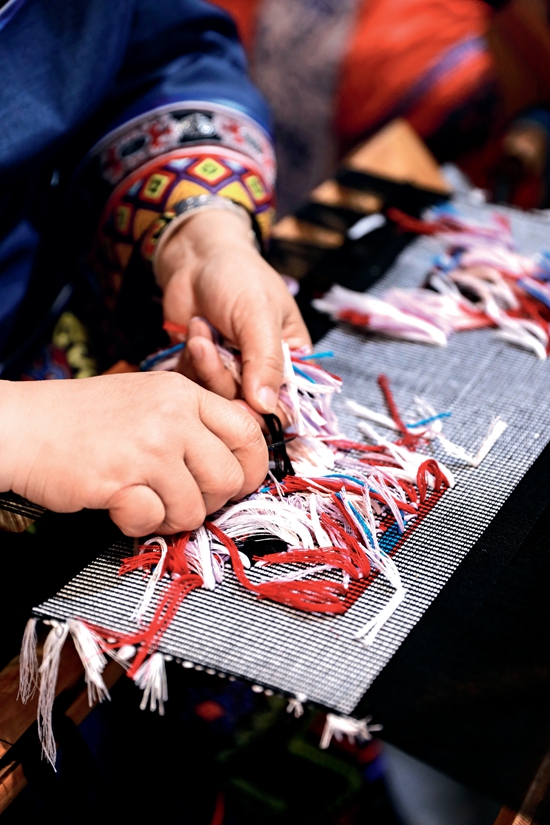
Inheritors
Liu Dai'e, a national inheritor of the weaving craft of Tujia brocade, was born into a Tujia family in a village, in Hunan Province, in 1955. Liu began learning brocade-weaving skills, from her grandmother, Peng Mei, when she was a girl. Peng was a known brocade weaver in the village. Liu has been fond of Xilankapu, and she has been able to weave abundant patterns since she was young.
Liu has devoted herself to protecting, developing and promoting Xilankapu since she graduated from high school in 1978. For decades, she has trekked deep into the mountains, and she has visited many Tujia villages, to collect the traditional Xilankapu patterns woven by the Tujia people. She has collected more than 100 pieces of old brocades, and she has tried to restore some of the patterns of the brocades. "The Tujia language does not have a writing system. Tujia brocade is not merely a craft, but it records the history and culture of the Tujia ethnic group. So, we must protect, inherit and develop it well," Liu says.
Liu is committed to the development and promotion of the brocade-weaving skills. In 2010, she set up a brocade-weaving and craft-training center in her village. Since then, she has trained hundreds of apprentices, and she has helped locals improve their lives by making Xilankapu. She has also developed Xilankapu products with aesthetic, fashionable elements. "We need to create high-quality, high-end brocades. Only in this way can we enhance confidence in ethnic culture, and achieve social and economic benefits," says Liu.
Ye Shuiyun, born in 1967, is another national inheritor of the brocade-weaving craft. When she was 12, Ye began learning brocade weaving and folk painting from Ye Yucui, her grandaunt and a national-level master of arts and crafts. In 1983, Ye Shuiyun became an assistant to her grandaunt, and she helped collect and sort traditional Xilankapu patterns. During the past three decades, she has dedicated herself to making, studying and promoting Xilankapu. She has also learned the techniques of tie-dyeing and wax printing, and she has innovatively integrated those techniques with the techniques used to make Xilankapu.
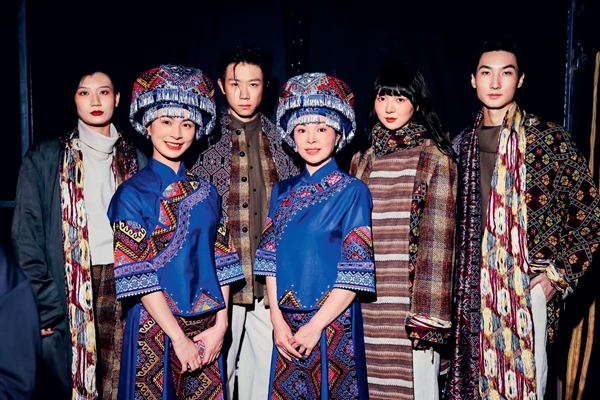
Modern Twist
Sisters Tan Yanhua and Tan Yanbin manage their clothing brand, which has combined Xilankapu elements with fashionable clothes and accessories, in their hometown, in Enshi Tujia and Miao Autonomous Prefecture, in Hubei Province. They have improved the Xilankapu-weaving craft, to make finer and more closely woven brocades, and they have innovatively developed Xilankapu products, with fashionable elements.
During the past few years, the Tans have established several Xilankapu-weaving bases in Enshi, and they have provided free training to local women, especially rural women and in-need women, to help them earn money by making Xilankapu products. They have also cooperated with colleges, as well as primary, middle and vocational middle schools, in Hubei. The sisters have also given Xilankapu-weaving courses and lectures attended by students. In 2022, they transformed the traditional brocade-weaving machine, making it easier for children and physically challenged people to operate. They received a national patent for their new type of brocade-weaving machine.
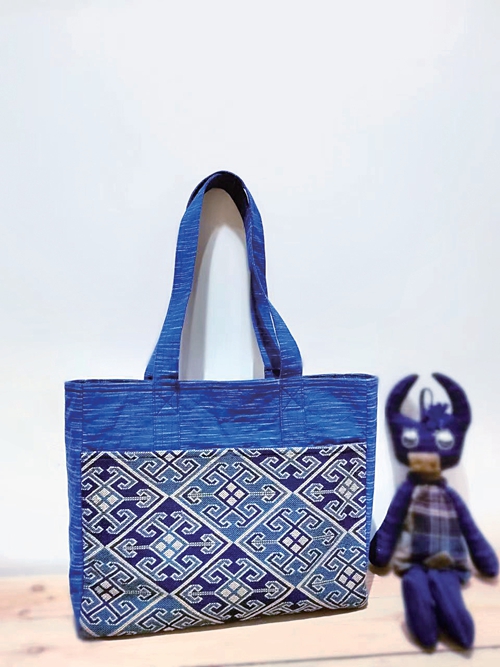
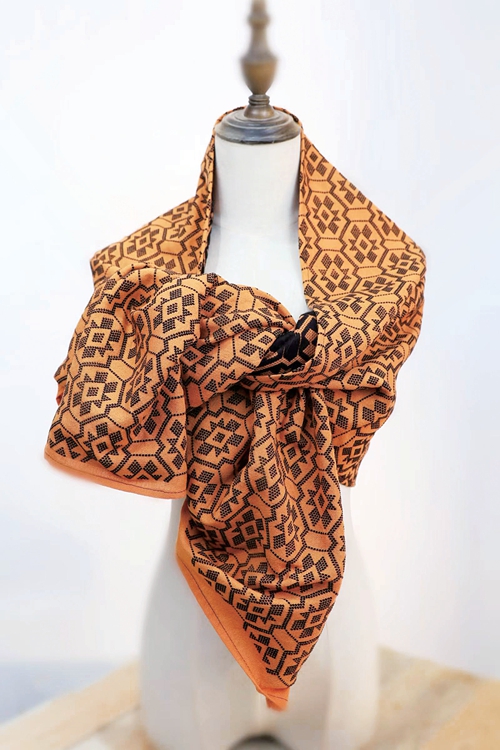
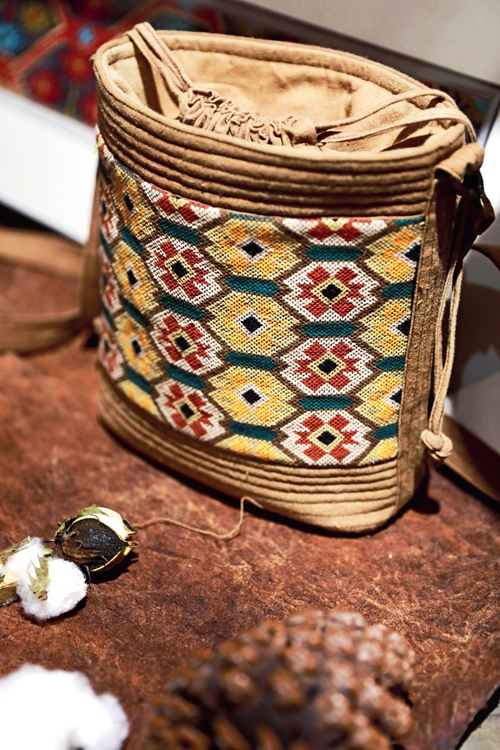
In 2023, the Tans became beneficiaries of the Genius Mom project. The project was initiated by the China Women's Development Foundation, in 2019, to provide assistance to craftswomen who wanted to inherit and promote intangible cultural heritage. The Tans became leaders of the project's craft workshop in Enshi. They have participated in the project's activities, through which they have obtained opportunities to cooperate with artists and designers. In September 2023, they participated in a charity fashion show, during China Fashion Week, at which time they shared the charm of Xilankapu.
"We hope more young people will contribute to the promotion of Xilankapu, and that they will inject life into the time-honored culture, to help Xilankapu go global," says Tan Yanbin.
Photos from Yang Feng and Interviewees
Source: China Women's Development Foundation
(Women of China English Monthly December 2024)
Editor: Wang Shasha
Please understand that womenofchina.cn,a non-profit, information-communication website, cannot reach every writer before using articles and images. For copyright issues, please contact us by emailing: website@womenofchina.cn. The articles published and opinions expressed on this website represent the opinions of writers and are not necessarily shared by womenofchina.cn.








.jpg)

 WeChat
WeChat Weibo
Weibo 京公网安备 11010102004314号
京公网安备 11010102004314号